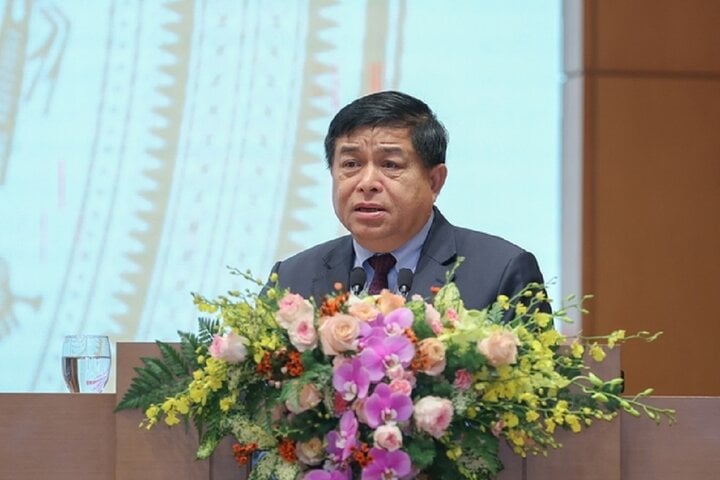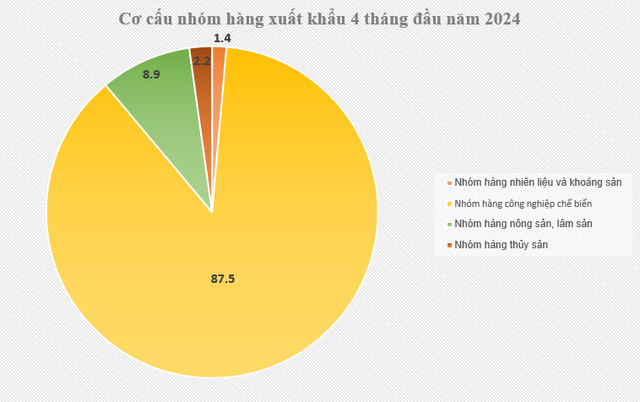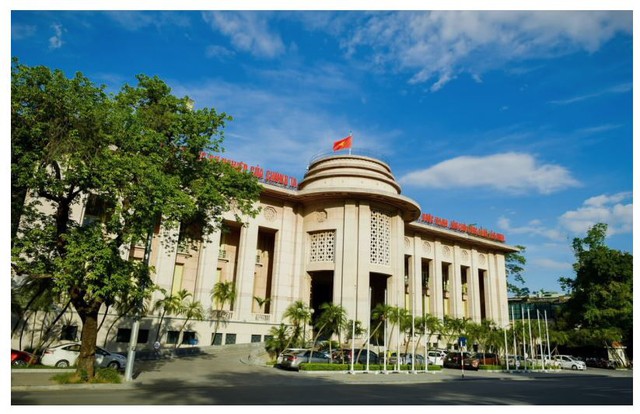The information was stated by Minister of Planning and Investment Nguyen Chi Dung at a Lunar New Year meeting with representative state-owned enterprises chaired by Prime Minister Pham Minh Chinh and Deputy Prime Ministers Le Minh Khai and Tran Luu Quang on the morning of March 3.
According to Minister Nguyen Chi Dung, in 2023, despite many difficulties and challenges, with the involvement, efforts, and high determination of the entire political system, our country has achieved remarkable results, becoming a bright spot in the global economy.
In that success, there is a positive and important contribution from the business community, especially state-owned enterprises.

Minister of Planning and Investment Nguyen Chi Dung. (Photo: VGP)
The actual total revenue in 2023 of state-owned enterprises is about 1.65 million trillion dong, exceeding the 2023 plan by 4%; of which, the revenue of 19 corporations, general corporations, and Viettel Corporation alone reached over 1.3 million trillion dong, accounting for nearly 80% of the total revenue of all state-owned enterprises.
Pretax profit of state-owned enterprises is about 125.8 thousand trillion dong, exceeding the 2023 plan by 8%; contributing about 166 thousand trillion dong to the state budget, exceeding the 2023 plan by 8%.
In 2023, state-owned enterprises focused on implementing investment projects ensuring approved progress, efficiency, and cost savings. Specifically, the total disbursed investment capital of 19 corporations and general corporations reached 161 thousand trillion dong out of the allocated capital of 208.328 thousand trillion dong, achieving nearly 80% of the 2023 plan.
Many key projects have been accelerated in terms of implementation progress, such as Nhon Trach 3 and 4 Power Plant Project, Long Thanh International Airport Project, Terminal T3 of Tan Son Nhat International Airport, Ho Chi Minh City – Long Thanh – Dau Giay Highways Expansion Project, etc.
“State-owned enterprises are increasingly demonstrating their leading, dominating, and guiding role in important and essential industries and sectors of the economy; contributing to macroeconomic stability, controlling inflation, promoting growth, ensuring major balances of the economy, and making practical contributions to building and developing the socio-economic sector and safeguarding the homeland. “, emphasized by Minister Nguyen Chi Dung.
However, the Minister of Planning and Investment also acknowledged that alongside the above-mentioned achievements, state-owned enterprises still have some limitations, such as some state-owned enterprises not fully maximizing the efficiency of allocated resources, capital, and state-owned assets, falling short of the annual investment capital disbursement plan for 2023, and some state-owned enterprises still operating at a loss.
The competitiveness, application of science and technology, innovation, and digital transformation are still limited; business management innovation is slow, has not approached good international principles and practices; the proportion of investment capital in important and essential industries and sectors has not met requirements…
Moreover, state-owned enterprises have not had large-scale investment and development projects to provide momentum, expansion, and create new impetus for growth, especially in new areas such as clean energy production, renewable energy, high technology (semiconductor chip manufacturing, hydrogen…).
“The above-mentioned existences and limitations originate from both objective and subjective causes; some problems in mechanisms and policies have not been promptly resolved; related regulations and laws on enterprise management, capital, assets, land, auction, bidding… are not consistent and not suitable for investment and business management and operation of state-owned enterprises in a market economy.”, evaluated Minister Nguyen Chi Dung.
Based on the above analysis and evaluation, the Minister of Planning and Investment pointed out 3 lessons learned.
First, the role, position, and mission of state-owned enterprises are enormous and challenging, but the rights, responsibilities, obligations, and interests of state-owned enterprises in general and workers in state-owned enterprises in particular are not commensurate; state-owned enterprises are not empowered to fulfill their roles and missions; the workers, especially managerial workers, are not encouraged to innovate, think, and do, making maximum efforts to contribute to the overall development of the enterprise.
Second, to develop the country quickly and sustainably, it is necessary to maximize and concentrate all resources that state-owned enterprises hold for investment and development, especially important national infrastructure construction projects, investment in capturing core technologies, developing new industries, trades, and products that are suitable for the development trend of the era.
Third, it is necessary to choose and appoint a team of competent and experienced managers for state-owned enterprises; at the same time, there should be a remuneration and benefits regime commensurate with the capacity and results of business management and operation of the enterprise.





































